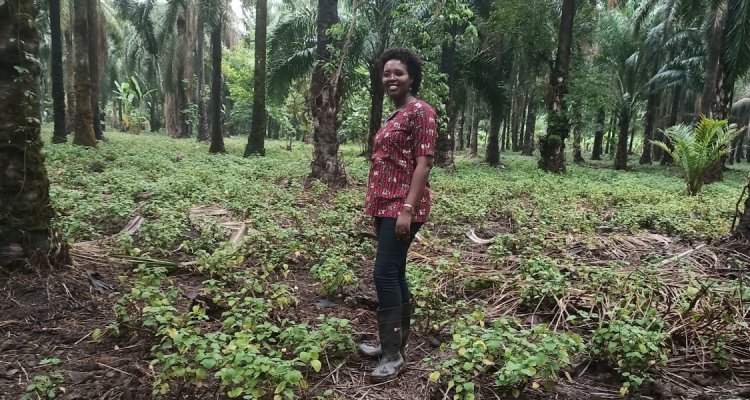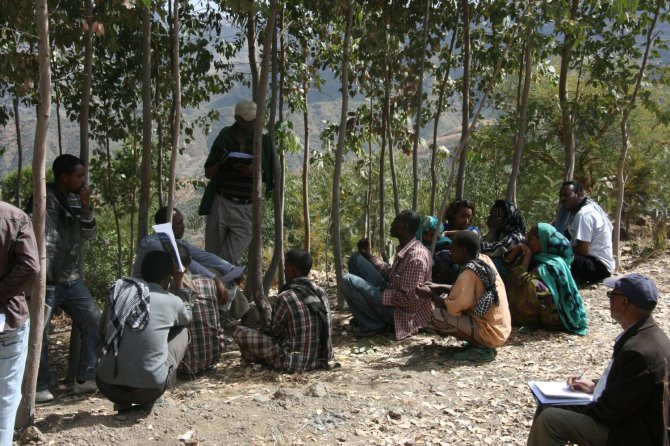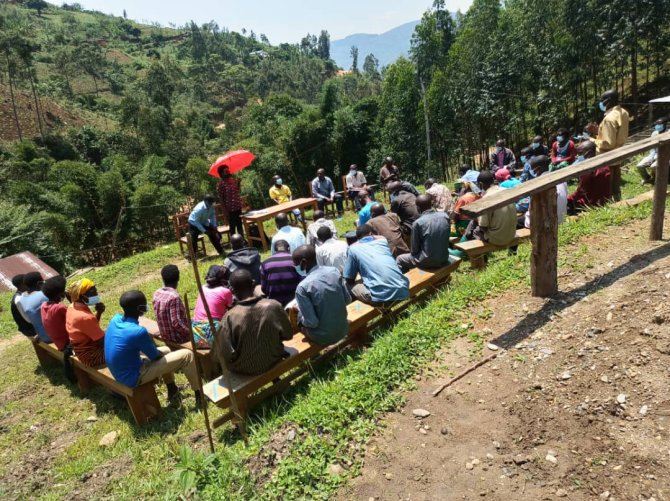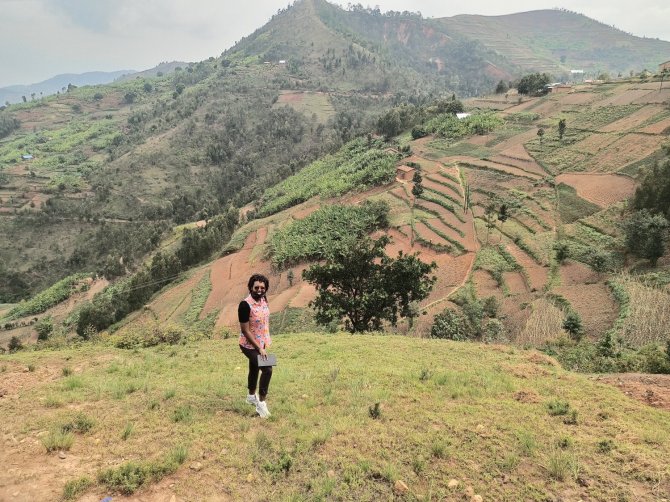
News
'What do farmers have to say to us?'
Listening to farmers has been a recurring theme throughout Françoise Umarishavu’s life. The idea grew as she did: from her father’s fields to the international conferences where, as a Rainforest Alliance representative, she calls for farmers to be taken seriously.
Françoise Umarishavu was born in the green hills of southern Rwanda and grew up among her father’s fields. ‘My father owned a large piece of land; we grew cassava, beans, avocados and lots more. We also had cattle, which I took out to graze as a small child. Together with my siblings, I helped with harvesting and weeding during the holidays. We really loved the land and the work.’ Since then, talking to farmers has been second nature to her.

Umarishavu went to college and got her bachelor's degree in agribusiness and started working for the One Acre Fund, an NGO that provides farmers with agricultural advice. ‘That's when I discovered how happy I am working with farmers.’ She then got an administrative job at the university, where she learnt a lot, but soon missed working with farmers.
‘I decided to look for a master’s degree in agriculture.’ She ended up choosing the University of Kassel, in Germany, where she was introduced to the principles of organic and sustainable agriculture. ‘And how we can make a difference by changing people’s behaviour, for example to combat food waste. It appealed to me, it fitted with my own values, because my mind is always with the people who are hungry, I’m all about helping them. But we also have to take care of the environment, because that affects our health too.’
Real change
Back in Rwanda, Umarishavu was offered a job as a lecturer at the university in Huye, but she decided to go for something more practical, because she wanted to bring about real change. She became an auditor for Ecocert, an international ecological certification body.
‘That way, I could help people to protect their lives. Farmers in Rwanda or Burundi grow coffee, tea or essential oils for export, and they often use pesticides that can be harmful to their own or consumers’ health.’
Farmers often get pesticides through a loan, giving them the impression that they are cheap – and they don’t learn how to use them. As a result, they sometimes spray far too much on the land, says Umarishavu. As an auditor, she can curb inappropriate use.
‘Together with a friend, I started a company, Gold & Green. We thought: why not create wealth, but in an eco-friendly way? We focus on training farmers so that they can get certification for their produce, such as a Rainforest Alliance, FairTrade or organic label.’
Last year, Umarishavu started working for the Rainforest Alliance label, representing the company in Rwanda and Burundi. This enables her to reach many more farmers with training and advice on how to make their farms more sustainable.

Connections in the food system
Yet Umarishavu was still looking for a way to place her work in broader perspective. ‘How can we feed our growing population and protect our environment at the same time? That is a huge task, and much is expected of our farmers – but they cannot make it happen alone. The government and big companies also need to help.’
These are insights Umarishavu gained when she attended the Food Systems Leadership programme, offered by Wageningen University & Research (WUR). She is now a Fellow of the African Food Fellowship, a network of leaders and innovators in agriculture and food processing in Africa.
‘I learned a lot about how different parts of the food system are connected,’ she says. ‘It starts with farmers, but the government needs to make good policies that support farmers. Currently the Rwandan government places a lot of emphasis on exports. Production of export crops – like coffee and tea – is encouraged, yet we should also think about healthy food for our own people. The government should also encourage food crops and NGOs should not underestimate the importance of agriculture.'

‘We often tend to wait with a plan or an action because there is not enough time or money, but from other Fellows I have learned that you can always create impact. You can just start.’
After completing the programme, Umarishavu started an initiative in which she trains farmers in Rusizi district to make organic fertilisers based on Tithonia, a nutrient-rich plant that is common in Rwanda.
She also continued her work for Rainforest Alliance, but she now understands even more clearly that farmers' voices are not heard by governments, big companies or NGOs: ‘Farmers are always a price taker. They don’t get to decide the price of a product.’
At the organisations that claim to represent farmers, I didn't see the real farmers
Umarishavu also gets to places where she can put farmers’ interests on the agenda, such as international conferences on food security. ‘The people who attend these are often very well dressed and stay in expensive hotels, but I don't see the type of farmer I know from my work in rural Rwanda – they don't make it there. And even at the organisations that claim to represent farmers, I didn’t see the real farmers.’
She has brought up this issue, for example at the Alliance for a Green Revolution in Africa summit. ‘I wonder why we don’t organise one of these conferences in the actual farmers’ fields, so that all the ladies and gentlemen can see with their own eyes how hard farmers have to work and the setbacks they face. We really need to listen to the farmers and what they have to say to us.’
Walking around at conferences is not her ultimate goal. ‘The real reward,’ she says, ‘Is when farmers come to thank me, because their crops have improved since they followed my advice. Or they tell me they’re making more money
The African Food Fellowship is a meeting place for emerging leaders, innovators and professionals working within Africa’s food system. They aim to create impact by understanding how change can come about and take action based on this.
The African Food Fellowship brings together a new generation of leaders, encouraging them in the work they are doing to make shifts in the power, policies and investments needed to transform food systems.
The Fellows followed the Food Systems Leadership programme, a Wageningen University & Research initiative in collaboration with Wasafiri Consulting in Nairobi, which receives financial support from the IKEA Foundation and University Fund Wageningen.